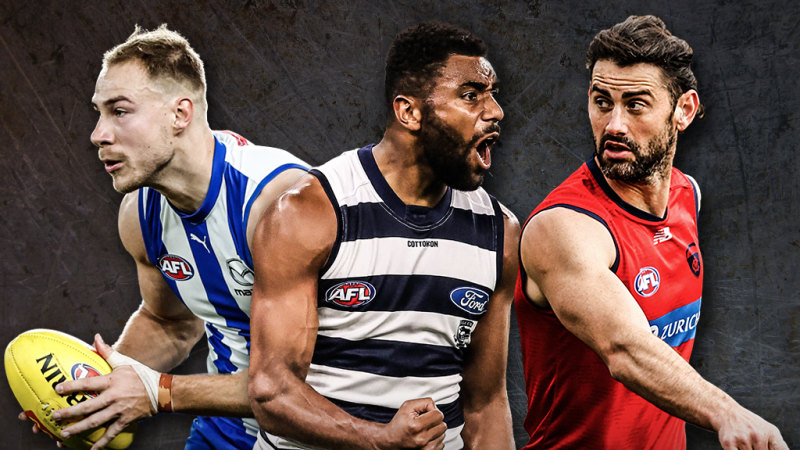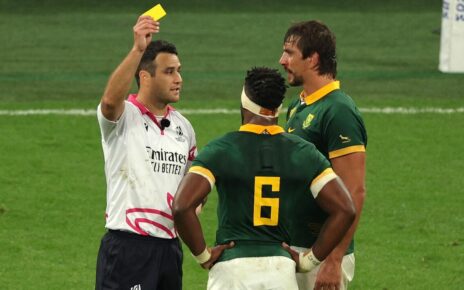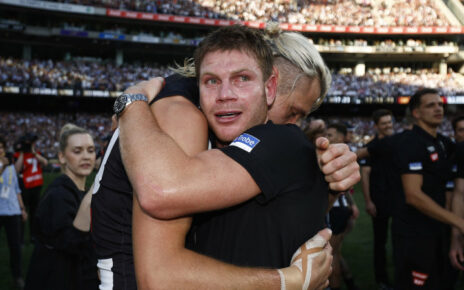Save articles for later
Add articles to your saved list and come back to them any time.
It’s no wonder trade period has become big business. This time of the year is entertaining.
It probably isn’t for those players and families in the middle of a potential trade, or players who are being shopped around, or their agents, or the wellbeing manager at clubs, or recruiters, coaches and the football department’s financial guru.
North Melbourne’s Ben McKay, Geelong’s Esava Ratugolea, and Melbourne’s Brodie Grundy will switch clubs in the next 10 days.Credit: Monique Westermann
But for the rest, it’s entertainment that will only become more regular fare when mid-season trading arrives, and there will hardly be a moment of the season when the potential move of a player to another club is not on the cards.
Facing that reality can make it easier for players attempting to navigate their way through the next few weeks.
It can also be useful for them to assess – with the help of a trusted manager and family – the bigger picture and the consequences of decisions they make, so there are no regrets.
In my case, money was never the thing that drove me. I always had a short-term focus on the next training session, the next game and the next group I was attempting to win a flag alongside.
My manager Tom Petroro was also aware of what motivated me and how the environment I was in at Geelong suited my football and my personality.
Once we had success in 2007, the coach Mark Thompson was able to impress on us that making some financial sacrifice to keep the group together would lead to success and a better result down the track.
None of our players fought hard over contracts during that period and the football manager Neil Balme always kept individuals abreast as to where they sat. The club earned goodwill that way, and it was reciprocated.
Every player had offers but (apart from Gary Ablett) only those seeking greater opportunities for senior football left. In Ablett’s case no one begrudged him the right to accept a godfather offer from the Gold Coast. Most of us thought he’d be mad not to do so.
Last year Geelong traded in players early in their career, including Ollie Henry. Credit: Getty Images
So what’s that decision-making formula given me? A club I can always call home, one I always feel welcome at and a connection that forms part of my identity.
If that’s what you want, that might be more valuable than a few more dollars in the pay packet when your career ends. Maybe, maybe not. But it’s worth knowing what is being given up when you obtain something.
Of course, many will say that clubs are ruthless, so players need to treat the game as a business.
It is true that it is a ruthless business, but your club is often the best judge of where you sit, and they are, generally speaking, worth listening to, particularly if they are on the same page as your manager, who knows you best and should be able to give you honest feedback, advice you’d be mad not to respect.
Steve Johnson and Mathew Stokes both played elsewhere late in their career but stayed loyal to Geelong at the height of the club’s success, which kicked off with the 2007 premiership win.Credit: Wayne Taylor
At the risk of sounding like a washed-up former player here, I reckon players and the media should put more weight on the prospect of digging in to earn your spot, whether that means dislodging the No.1 ruckman, small forward or midfield veteran by working harder and being more diligent and continually striving to become a better footballer as your No.1 goal.
I am a big believer in fighting for your spot. It became a real chip on my shoulder when I was dropped or if I wasn’t in the team, I knew my attempts to rectify the situation would determine how my teammates respected me.
Once that option is explored then all power to the players to sort something else out in their careers. My suspicion is that some players (not all) take an easier option out of genuine fear their AFL career could be over and seek a soft cushion elsewhere.
With 18 teams, if you are a half-decent player you are going to find someone who is interested in taking you on board.
Lincoln McCarthy left Geelong for the right reasons and has enjoyed success at Brisbane.Credit: Getty
And during this period that player might even go from a fringe player to someone people talk about as though they could change the fabric of another club. That is often entertaining too.
Of course, there are absolutely times when the right thing for everyone is for the player to move.
Ex-Geelong player Lincoln McCarthy fits that bill. He needed a change and went to Brisbane where he has become a consistent performer in a good team. He has two homes because of the way he conducted himself at the Cats and then made a success of it at the Lions. More than half of Geelong would have been barracking for the Lions last Saturday simply because he was in their colours.
One of his teammates, Deven Robertson, also showed his character when he stuck with the Lions after playing in a grand final, rather than accepting a long-term offer from West Coast that would have allowed him to return to Western Australia.
Such buy-in from players comes because the culture is strong. Decisions such as the one Robertson made strengthen that fabric. That makes him an even more valuable player than he was three weeks ago.
There are also circumstances where players are entitled to feel dudded when a club promises them a position is theirs for the taking before bringing in a player from another club who can only play in their role. Of course, competition is good, but there is also a need for players to trust the motivation clubs have for certain decisions during this fortnight.
Other players will be hunting for homes after being delisted. I coped OK in the end with being delisted by Geelong because I knew I could honestly say I had given as much as I possibly could to make my career. I wouldn’t say it was easy; no player who has a long career ever accepts they’re done. Why would they when they spent their whole lives fighting for their spot?
However, for those who get cut well before they are ready, it can be a bitter pill to swallow.
What I have learnt, though, is that, regardless of the circumstances, in time the disappointment fades, and you become more settled in the next phase of life.
Geelong always looked after me. They gave me a job that led to working at the AFL, so players need to have the vision to see into the future aware of the consequences of their decisions.
That’s not easy in your mid-20s. But it’s vital. Decisions made in the next fortnight can make or break a career. That is entertaining for many supporters, whether the individual likes it or not, so just accept it as much a part of the business you are in as working out a stoppage set up.
Weigh your calls this fortnight up as a life, not just a football, decision, understand your values and what is important to you and those around you, and you will never regret the direction you take.
Mathew Stokes is a Larrakia man who played 200 games with Geelong and Essendon. He played in Geelong’s 2007 and 2011 premiership teams.
Keep up to date with the best AFL coverage in the country. Sign up for the Real Footy newsletter.
Most Viewed in Sport
From our partners
Source: Read Full Article







